
To help ensure your visit goes as smoothly as possible, try taking the following steps. Is there anything I can do to prepare for my first pregnancy appointment? Your doctor will also discuss recommended vaccinations, like the flu shot and the COVID-19 vaccine.
#First time doctor visit check up list how to
Other topics include the do's and don'ts of exercise, travel, and sex during pregnancy environmental and occupational hazards that can affect your baby and how to avoid certain infections, such as toxoplasmosis. If you need help quitting smoking or any other substance, your provider can recommend a program or counselor.


The dangers of smoking, drinking alcohol, using drugs, and taking certain medications will be a topic of discussion, as well. If you're feeling depressed or anxious, let your provider know so you can be referred to someone who can help. Your provider may screen you for signs of depression during pregnancy. Typically done between weeks 11 and 13, it consists of a blood test and a type of ultrasound called a nuchal translucency. Performed at 9 weeks of pregnancy or later, it's used to examine the little bits of your baby's DNA present in your blood.Īnother test that will be offered is a first trimester screen, also called a first-trimester combined test. You'll also be offered noninvasive prenatal testing (NIPT), also called cell-free fetal DNA testing. Your provider will offer you various screening tests that can give you information about your baby's risk for birth defects and chromosomal conditions like Down syndrome. Your provider can talk to you about the risks at your first visit and throughout your journey.Įxplain your options for prenatal genetic testing. As a result, high-risk pregnancies need extra care. While many potential troubles are treatable or temporary, some can be dangerous to both parent and baby. Have certain pre-existing health problems, such as high blood pressure, thyroid disease, or type 1 or type 2 diabetes.Have certain medical issues that develop during pregnancy, such as preeclampsia and gestational diabetes.Become pregnant for the first time before age 18.Become pregnant for the first time at age 35 or older.That means there is a higher-than-average chance of health issues during pregnancy, in labor, and at birth. Determine immunity to rubella (German measles) and chickenpoxĭiscuss any high-risk pregnancy concerns: Many people are considered to have high-risk pregnancies.Check for HIV, syphilis, hepatitis B and, in certain cases, hepatitis C.Your provider will also order blood tests to: A urine sample to test for urinary tract infections and other conditions.A pelvic exam, including a Pap smear (unless you've had one recently) to check for infections such as chlamydia and gonorrhea or abnormal cells that could indicate cervical cancer.But if you don't have any medical problems or concerns, it may not be part of the routine. Some healthcare providers will do an ultrasound. You can expect a number of standard exams and tests at your first prenatal visit.

Also important to mention: potential exposure to toxins, especially if you live or work near toxic materials.Ĭheck you out and run some tests. Let your provider know whether a relative in either family has a chromosomal or genetic disorder, had developmental delays, or was born with a structural birth defect. Many genetic issues and birth defects are at least partly hereditary, so learning about your family history helps your medical team keep an eye out for potential issues. Your healthcare provider will also ask about your family medical history. Medications, supplements, vitamins, and herbal drugs you take.Whether you are being or have been abused, or have another situation that could affect your safety or emotional well-being.Mental health difficulties and diagnoses.Current or past diseases and conditions.Current or past gynecological conditions, including sexually transmitted infections.Symptoms or problems you've noticed since your last period, whether they’re related to pregnancy or not.The first day of your last period (to determine your due date).Whether your menstrual cycles are regular and how long they tend to last.Your provider will ask several questions about your gynecological health, personal medical history, and lifestyle habits.


 0 kommentar(er)
0 kommentar(er)
